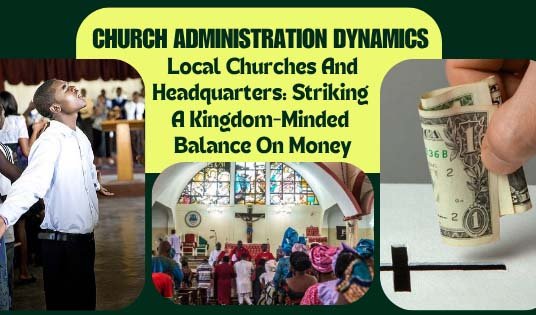Beloved brethren, it is crucial that we humbly and boldly address this matter today. There are many conflicting voices, opinions, and practices surrounding the handling of finances between local assemblies (branches) and church headquarters. Unfortunately, murmuring, backbiting, and division are on the rise in many ministries, and breakaway churches are becoming more frequent. This has led to spiritual unrest, and it’s time we shed light on this delicate yet necessary subject that has caused too many wounds in the Body of Christ.

A. CHURCH PLANTING – ACTS 16:5
Some ministries operate a single-church model, while others are committed to church multiplication (church planting). According to God’s Word, His desire is that churches multiply and spread across every city, tribe, language, and nation (Matthew 28:19-20). A healthy, Spirit-filled local assembly must eventually give birth to other churches, just like a living organism reproduces. Reproduction in ministry is God’s design—it’s Kingdom “planned parenthood.”
Biblical truths about church planting:
- New churches reach more souls than remaining in a single location.
- Bringing the church closer to the people is a divine strategy for harvest.
- New churches are better positioned to reach new demographics and unreached communities.
- They raise new leaders and help believers discover their callings and spiritual gifts.
- New church plants tend to grow faster due to their focus, agility, and relevance.
- Church planting remains the most effective strategy for global evangelism and Kingdom expansion.
⚠️ However, the motive for church planting must be pure and Kingdom-centered. It should never be driven by:
- A love of money
- Ego or self-glorification
- Business principles
- Pride or empire-building mentality
The ultimate goal must be the salvation of souls and the advancement of God’s Kingdom in every heart and every region.
B. THE PLACE OF HEADQUARTERS – ACTS 11:27–30; 15:4; 13:1–3
In the New Testament, we see Jerusalem function as the central (administrative) headquarters, while Antioch served as a missionary-sending base. Similarly, every ministry today should have a headquarters that acts as a spiritual and operational base—much like an apostolic center—that provides leadership, training, direction, spiritual oversight, and logistical support to its branches.
A strong and effective headquarters must:
- Be growing numerically and financially by God’s grace.
- Be evangelism-focused, not just administration-heavy.
- Offer discipleship and ministerial training to equip the saints.
- Set the pace for Kingdom growth and revival.
- Model generosity and giving in word and deed.
- Actively engage in church planting and missions.
- Be willing to send forth trained leaders and missionaries.
- Nurture, empower, and release local assemblies with Kingdom vision.
☑️ Headquarters must be a support structure, not a burden. Leadership networking, pastoral mentoring, and ministry training should be part of its apostolic responsibility to the churches under its care.
C. WHEN HEADQUARTERS STARTS MILKING THE BRANCHES FINANCIALLY
Sadly, many headquarters behave like a government bureaucracy—like a strong federal center weakening its states. In truth, some headquarters plant branches primarily to serve as revenue-generating centers rather than as outposts of the Kingdom.
These practices are unhealthy and unbiblical:
- Demanding 100% of tithes from the branches.
- Collecting all offerings, including thanksgiving and special seeds.
- Imposing endless levies, assessments, and fundraising targets.
- Offering no support to branches for land, building, or growth.
- Paying meager or no salary/stipend to branch pastors.
- Operating a master-servant model, not a father-son relationship.
- Constantly taxing the branch and its members for headquarters projects.
- Stifling expansion by siphoning every financial resource.
- Charging yearly levies for founders’ anniversaries and celebrations.
⚠️ The outcome of these practices is:
- Subtle financial manipulation (a form of unfaithfulness).
- Breeding resentment, disloyalty, and murmuring among pastors and workers.
- Causing ministry stagnation and arrested development.
- Disillusioning genuine leaders, leading to breakaways or spiritual burnout.
- Ultimately resulting in spiritual decline, not revival.
Recommended Reading
Administering Church Discipline – The Right Way
20 Practicable Ideas For A Successful marriage
Godly Companions – How to Choose Your Friends and Associations
D. KINGDOM-FOCUSED FINANCIAL RELATIONSHIP BETWEEN HEADQUARTERS AND BRANCHES
I am fully aware that some ministry leaders might find these insights uncomfortable. However, the heart behind this message is love for the Body of Christ and a desire to see the church healthy, growing, and impacting the nations.
Let us aim for a more balanced, biblical, and Kingdom-minded system. Here’s a recommended framework:
Ideal Kingdom Practices:
- Strong headquarters should plant viable, Spirit-led branches.
- New pastors must be financially and spiritually supported during their initial phase.
- Give each new church a two-year “grace period” before any financial remittance.
- Allow local churches to oversee and manage their own finances.
- Encourage transparency through proper financial documentation (income and expenses).
- Branches may send a reasonable percentage (e.g., 20%) of their tithes or income to headquarters as honor and accountability, not as a tax.
- Occasionally, branches may contribute to joint projects, but not as a burden.
- After two years, the branch should take full responsibility for the welfare of their pastors and ministry workers.
- Local churches should manage and develop their properties, lands, and buildings under spiritual supervision.
- Headquarters should ensure regular visitation, reporting, and mentoring.
- Branches must submit monthly reports covering attendance, finances, and ministry impact.
✅ These principles will promote growth, unity, trust, and spiritual fruitfulness. If applied diligently, local churches will flourish—numerically, financially, structurally, and spiritually.
FINAL WORD
May we remember that the Church belongs to Jesus Christ, not to any individual or institution. Let us steward the ministry entrusted to us with fear of God, wisdom, love, and humility. A healthy relationship between headquarters and local churches will result in a vibrant, multiplying, and Spirit-filled church—a true reflection of God’s Kingdom on earth.
